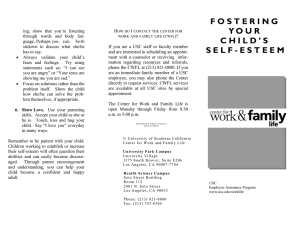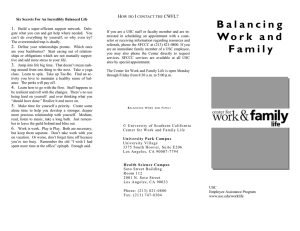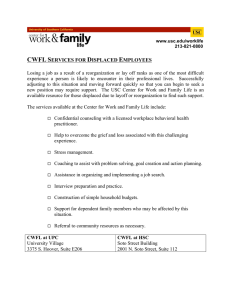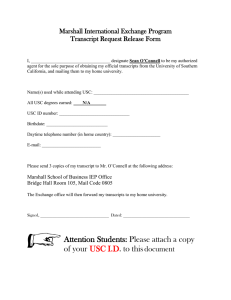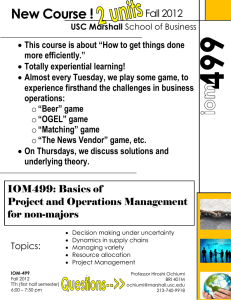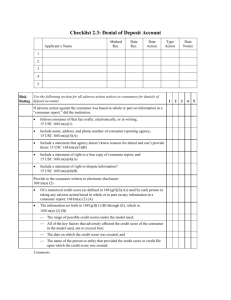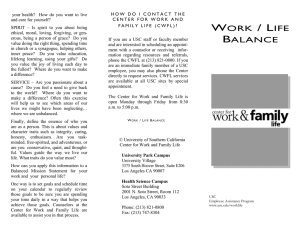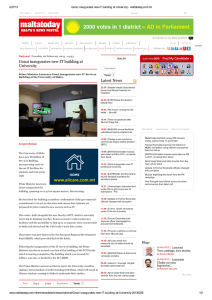I m p r o v i n g
advertisement
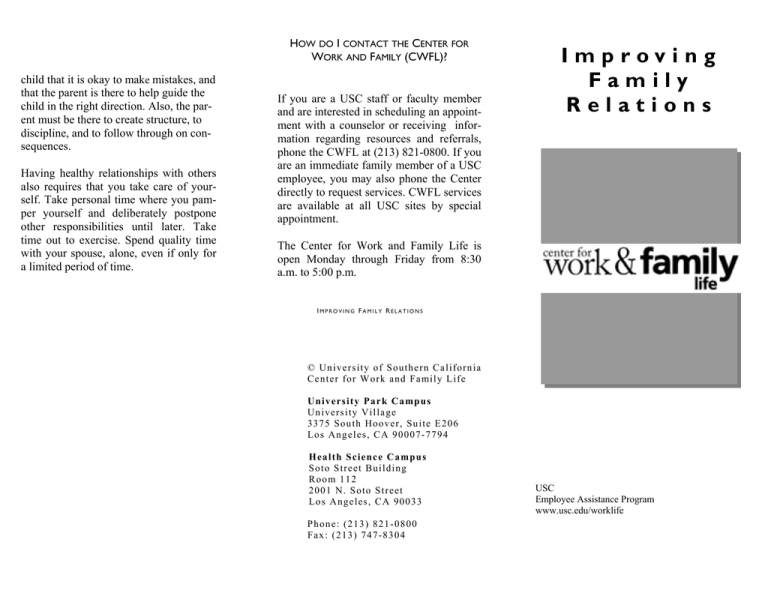
HOW DO I CONTACT THE CENTER FOR WORK AND FAMILY (CWFL)? child that it is okay to make mistakes, and that the parent is there to help guide the child in the right direction. Also, the parent must be there to create structure, to discipline, and to follow through on consequences. Having healthy relationships with others also requires that you take care of yourself. Take personal time where you pamper yourself and deliberately postpone other responsibilities until later. Take time out to exercise. Spend quality time with your spouse, alone, even if only for a limited period of time. If you are a USC staff or faculty member and are interested in scheduling an appointment with a counselor or receiving information regarding resources and referrals, phone the CWFL at (213) 821-0800. If you are an immediate family member of a USC employee, you may also phone the Center directly to request services. CWFL services are available at all USC sites by special appointment. Improving Family Relations The Center for Work and Family Life is open Monday through Friday from 8:30 a.m. to 5:00 p.m. IMPROVING FAMILY RELATIONS © Un iv ersity of Sou thern Californ ia Cen ter for W ork and Family Life Univ ersity Pa rk Campus Un iv ersity Village 3375 Sou th Hoov er, Su ite E206 Lo s Ang e les, CA 90007-7794 H ea lt h S c ien c e C a m pus Soto Street Building Roo m 112 2001 N. Soto Street Lo s Ang e les, CA 90033 Phon e: (213) 821 -0800 Fax : (213 ) 747-8304 USC Employee Assistance Program www.usc.edu/worklife I M P R OV I N G FA M I LY R E L AT I O N S Family Structure Families come in many different combinations: Single, mixed, multi-racial/ cultural, one parent income, two parent income, the father or mother is a homemaker and many other combinations. No matter how a family is put together, a healthy, strong family is what we strive for. So what is a healthy family? It is a unit of two to several people that work together by compromising, being respectful of one another’s differences, loving, and being able to adjust to stress or change. How families function as a whole is much more important than how a family is put together. The following are helpful ways for families to stay strong and healthy: Communication is crucial. There needs to be room for open communication, and family discussions are a big part of the ongoing communication process. When changes occur or added stress kicks in, a healthy family will be able to adapt without falling apart. If an individual family member has a need, s/he asks for help. Each member knows what’s expected of them, and they are willing to be held accountable for these designated responsibilities. Children especially need to learn this at a young age. Participating in family functions is very important in maintaining a healthy dynamic within the family. Family traditions, activities, etc., are ways to share time. Sharing values is an important foundation for any healthy family. Moreover, participating as a family in helping others, having close relations with friends, neighbors, etc., builds a connection within the family. Finally, commitment to one’s family through unconditional love is a unique gift. Accepting and appreciating each individual member for his or her uniqueness ties family together. To sum up, a healthy family must have love, respect, and acceptance of the individual members, and at the same time, a healthy blend of discipline, responsibility, and clear limits to maximize a healthy family dynamic. Even in the healthiest families, challenges will arise. Not everybody will feel happy and there will be disagreements, but such challenges can actually turn into positive opportunities for growth and development. When a family member wants to have their needs met without considering other family members, it’s crucial that the parent step in with clear limits and consequences for unwelcome behavior, and that they offer choices to promote cooperation within the family. Pointers to Consider for Parents Consistency is important. Discuss with your children what is acceptable and what is not, and explain the consequences if your limitations are ignored. Discuss feelings, but once rules are established, follow through every time. It is much less confusing. Treat children with the same respect you would an adult. If angry or upset, calm down and do not yell or scream if mistakes are made. Give constructive advice rather that destructive criticism. Double-standards must be avoided. Don’t preach about unacceptable behavior if you yourself engage in such. Take a look at yourself and change behaviors you would not want your child to engage in. Shower your child with positive words and compliments. Focus on the good deeds they do. This builds on their strength and promotes a higher sense of self-esteem. Praise and encouragement can go a long way because children constantly seek parents’ approval, love, and recognition. There needs to be room to grow, make mistakes, try, fail, and try again. Parents must be there during bad times as well as good times to assure the
